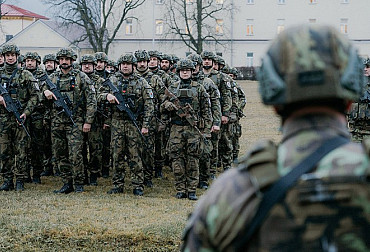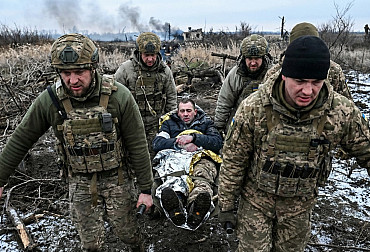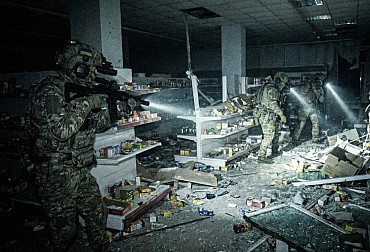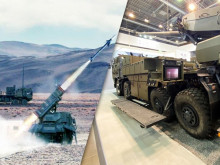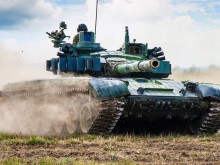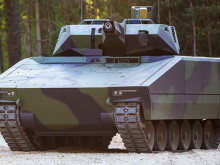Two percent of GDP for defence for the Czech Republic
One of the key questions for the Ministry of Defence, but also for contemporary Czech politics, is whether the Czech Republic should increase its defence spending to 2 % of GDP, a question that has been raised in the Czech public sphere for some time and which has now become more topical.
The current Government of Petr Fiala is in a difficult situation in this respect, much more difficult than previous Governments. On the one hand, today's Government must respond to the deterioration of the security situation in Europe and to current events in eastern Ukraine, where there is a real danger of open war. In fact, the only historically proven response to such a situation, apart from diplomatic activities, is to improve the country's defence capabilities and strengthen its military potential, which, of course, entails increased costs. On the other hand, the Czech Government is facing the current covid crisis and the associated decline in economic growth, but also a significant state budget deficit and rapidly growing debt, which in turn is forcing the Government to take austerity measures. It is therefore a completely contradictory situation, which would be difficult for any Government, even the best one. How, then, should we address the situation today, how should we approach this problem?
On the face of it, everything is simple. The current Government is made up mostly of parties that had increasing defence spending to 2 % of GDP in their programme (ODS, TOP 09, STAN). These parties have had this point in their programme for a long time and have often criticised the previous Government of Andrej Babiš in this context precisely for keeping defence spending well below this level and for not trying to increase military spending, despite the fact that the Babiš Government has committed itself to doing so. The logical solution should therefore be to increase defence spending, and to do so as quickly as possible. Firstly, to increase the Czech Republic's military potential in today's difficult security situation, but also to make up for the debt of previous years.
However, low defence spending is not just a phenomenon of the previous Government; it is a long-term problem where politicians are underfunding our military. As a result, the Army is carrying a multi-billion dollar internal debt (estimated at CZK 300-400 billion), and it shows in its weaponry. The two per cent GDP budget for defence should not be seen as an increase, but as a kind of process of 'normalisation' of the situation, and should be presented as such.
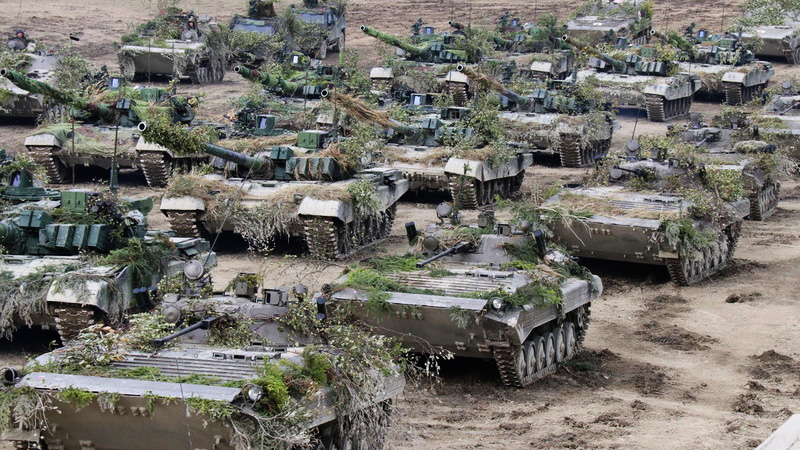 Picture: However, low defence spending is not just a phenomenon of the previous Government; it is a long-term problem where politicians underfund our military. The Army is thus dragging a multi-billion internal debt (estimated at CZK 300-400 billion), and it is visible in its weaponry. (illustration photo) | Ministry of Defence of the Czech Republic
Picture: However, low defence spending is not just a phenomenon of the previous Government; it is a long-term problem where politicians underfund our military. The Army is thus dragging a multi-billion internal debt (estimated at CZK 300-400 billion), and it is visible in its weaponry. (illustration photo) | Ministry of Defence of the Czech Republic
At the end of last year, in the framework of the joint programme statement of the Government coalition, it was also stated that the SPOLU and PirSTAN coalition wants to enforce the commitment to spending 2 % of GDP on defence in the budget from 2025 onwards by means of legislation. The Ministry of Defence and the Army of the Czech Republic would thus be able to plan within a fixed financial framework for years to come, which would, among other things, protect against unconceptual changes in modernisation projects, equipment purchases or services. Moreover, it would be a clear signal to NATO that the Czech Republic has a clearly defined and legible defence policy.
Thus, the much-talked-about figure of 2 % of GDP for defence is not just some artificial invention. Nor is it some kind of NATO dictate, as is sometimes assessed by various populist parties. On the contrary, this figure has its rationality and its justification. The question of determining the optimum level of defence spending is a very complex one and should take into account the geopolitical situation of a given country. Of course, a country that is under immediate threat from an aggressive neighbour has a completely different need for military expenditure than a country in a peaceful environment, far from security risks. This is also why different countries have different defence expenditures. Of course, it also depends on the political nature of the country; various totalitarian, non-democratic countries usually have very high military expenditures (e.g. the Soviet Union used to spend 20-25 % of its GNP on defence, North Korea has similar expenditures today), whereas in democratic countries military expenditures tend to be much lower.
A threshold of 2 % of GDP spent on defence ensures that a country has a meaningful armed force to ensure its own security. They also ensure the natural renewal of technology in line with technological progress. If defence spending is lower, then of course this has a negative impact on the capabilities of the Army and therefore on the country's defence capability. Moreover, 2 % of GDP on defence is still a relatively small figure, not threatening the economy of the country in question.
The Czech Republic has maintained its military spending at a very low level over the long term, e.g. after 2010 it reached about 1 % of GDP. As a result, the Czech Army has partially lost its combat capabilities. There has been a significant reduction in numbers, or the numbers of professional soldiers that were originally planned have not been achieved. Low military spending has also made it impossible to implement modernisation programmes and to allocate adequate resources for the replacement of old or completely obsolete equipment with more modern types. As a result, a significant part of the Czech Armed Forces' equipment is already obsolete and in many cases consists of types inherited from the Czechoslovak People’s Army era.
Moreover, 2 % of GDP on defence is not sufficient for a given state to defend itself with its own forces. The Czech Republic can only have such low defence spending in relation to GDP thanks to its membership of NATO, which operates on the principle of collective defence. If the Czech Republic were to provide for its own defence, if it were to rely on its own forces alone, then its military expenditure would have to be much higher, and would certainly exceed 3 % of GDP. This factor in particular should be borne in mind by the various critics of NATO.
The fact that military spending has already been partially increased, to around 1.3 % of GDP in 2021, is a partial advantage. Nevertheless, these figures are still very far from 2 % of GDP. On the other hand, the Czech Republic is facing extensive economic difficulties. It is not just that there has been a fall in economic growth and, therefore, a reduction in state budget revenues. It is also about the issue of the disproportionately high state budget deficit and the high national debt, which today's Government has also pledged to tackle in its pre-election programmes. Nevertheless, the current Government has declared its ambition to achieve defence spending of 2 % of GDP by the originally planned deadline, i.e. by 2025. The current Government therefore de facto has only three years, or three state budgets, to realise this ambition, and this would therefore be a fairly radical increase in defence spending.
The increase in the Ministry of Defence budget would then enable some key rearmament programmes to be implemented (acquisition of new IFVs, new tanks, etc.) or some necessary investments in infrastructure. It would also be possible to implement an increase in the size of the Armed Forces.
The current economic crisis is also affecting the psychology of the people, the soul of the nation. This situation is underscored by the fact that the Government is planning quite extensive cuts in the state budget - and in most ministries. These cuts will, of course, also affect citizens directly. In such a situation, more and more people may ask why spending is being increased in the defence ministry and not, for example, in the transport ministry. It is the long-term underfunding of our army, in conjunction with the current security situation in Europe, that should then be the answer.
The Czech public currently supports the Czech Armed Forces quite highly, as various opinion polls show. This is despite some of the problems and scandals that have been associated with the defence ministry in the past. The high support of the Army by the population is also indicated by the participation of thousands of people in events such as Bahna and Cihelna event, NATO Days, etc., the existence of various military-historical associations, as well as organisations such as the Czechoslovak Legionary Community, etc. Thus it turns out that the Czechs are not only a "nation of Švejks", as we are sometimes presented.
The answer to the question of whether the Czech Republic should increase its military expenditure to reach 2 % of GDP is clearly in the affirmative. Current defence spending is inadequate and does not allow us to ensure the full defence of the Czech Republic, nor does it allow us to respond adequately to the deterioration of the security situation in Europe. Expenditure must therefore be increased, both in absolute terms and as a percentage of GDP.
It is obvious that today's leadership of the Ministry of Defence is well aware of the political and social sensitivity of the issue of increasing military expenditure. Therefore, the Ministry of Defence is currently adopting an interesting approach by recalculating whether all the items that the Czech Republic spends on its defence are actually included in military expenditure. This has its rationality. It is perhaps surprising, but there is no universal methodology by which defence spending should be calculated. There is no such thing within Europe (when in the past, especially during the Cold War, there were various disarmament negotiations in which, among other things, the amount of defence spending was discussed), nor even within NATO. Therefore, individual states calculate their military expenditure differently, and everyone counts something different. And it is not just the fact that different armies have different types of troops, with some states, for example, having navies and landlocked states not having navies. It's more about those expenditures that are less visible. For example, the currently much talked about fight against cyber threats (which requires considerable sums of money) is somewhere included in the budget of the Ministry of Defence (and is therefore included in defence spending), but usually this issue falls under the responsibility of the Ministry of the Interior (and this spending is then not under the Ministry of Defence).
It is therefore good that the current leadership of the Ministry of Defence is trying to put some order in the above. It is possible that it will turn out that defence spending in the Czech Republic is actually higher than thought, and that it probably already stands at 1.5-1.6 % of GDP. Nevertheless, the question is whether this approach is sufficient. In the author's view, it would be much better to try to come up with some kind of initiative within NATO to develop some kind of universal methodology for calculating military spending. Such an initiative might be more effective than it may seem at first sight. The creation of such a methodology would eliminate all the disputes about the level of expenditure that regularly arise within NATO. Moreover, the current recalculation of defence spending only within the Czech Republic, only in the budget of the Ministry of Defence, or the state budget, has one major weakness. In this way, the Czech Republic's defence spending may be closer to 2 % of GDP, but only formally, on paper. In reality, the army will not see any extra money - only that resulting from the natural increase in GDP. And maybe not even that. And that's wrong, of course. Because the Army needs real funds. Funds to maintain its current capabilities, but not least to make acquisitions that have been long deferred - the acquisition of new BMPs, the acquisition of tanks, etc. Only real, not just paper, increases in defence spending can provide something like that. Funds provided within some clear framework, ensuring stability, while allowing for a long-term perspective.
One thing must be remembered. A potential adversary of the Czech Republic - whoever it may be - will not be deterred from military action by the official amount of military expenditure alone, a mere number in the state budget. Potential adversaries will be deterred primarily by sufficiently strong, well-functioning and, last but not least, well-armed armed forces. An army with sufficient numbers of soldiers, but also modern tanks, IFVs, etc. An army that is prepared but also properly equipped to deal with new security threats such as cyber security, etc. The Czech Republic should focus on building such an armed force in a realistic way - with the help of systematically, but above all, actually realistic increases in defence spending. A mere formal increase in official defence spending is not enough.











